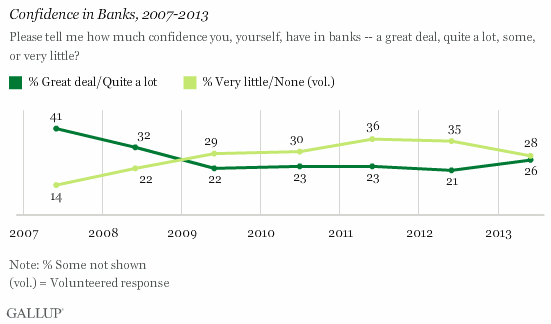Americans' confidence in U.S. banks has rebounded a bit from the low it hit in 2012. Gallop reports that 26 percent of recent survey respondents said they have a "great deal" or "quite a lot" of confidence in banks compared to 21 percent such responses last year. This is the highest level for these responses since June 2008 when confidence peaked at 41 percent before beginning to erode, ultimately by 20 percentage points.

Gallup asks questions about banks and a variety of other institutions in regular surveys and has since 1993 and periodically before that. In the most recent survey, conducted from June 1 to 4, banks ranked 10th among 16 Institutions but showed greater improvement than any of the others.
The percentage of Americans saying they have a great deal or quite a lot of confidence in banks is now about the same as the percentage expressing little or no confidence (28%). Not only has the percentage of those who have confidence in banks increased, but also the percentage of those expressing a lack of confidence has declined.

Gallup said when it first asked about confidence in banks in 1979 60 percent of respondents expressed the highest degrees of confidence, second only to the numbers garnered by the church. This number hasn't been matched since and Gallup said that earlier showing probably resulted from the strong U.S. banking system established post-Great Depression and the related efforts of banks and their regulators to build confidence in the system.
Even through the 1980s recession banks stayed above 50 percent and generally ranked in the top half of institutions tested. The Savings and Loan crisis of the late 1980s and early 1990s took its toll and confidence fell to a new low of 30 percent in October 1991 but gradually climbed back to 53 percent by May 2004.
Gallup said Americans' confidence in banks may finally be starting to recover from the recession and financial crisis of 2008-2009 but these perceptions generally take a long time to change as illustrated by the slow recovery after the Savings and Loan crises. Behavioral economics suggests this time it might take even longer.
It is not clear exactly what is driving the uptick in confidence - it might be the banks' performance on 'stress tests", or the improvement in bank balance sheets and earnings, Gallup says. The improvement might be linked to the U.S. Economy itself, which while struggling, is performing better than most others in the world.
"Given this context," Gallup says, "Americans' improving perceptions of their banking institutions appear to be realistic. In turn, this provides an opportunity for banks, their regulators, and their stakeholders to build on and create momentum for increasing Americans' confidence in the U.S. banking system. A strong banking system, including strong public confidence, is essential if the U.S. economy is going to achieve strong, sustainable economic growth."







